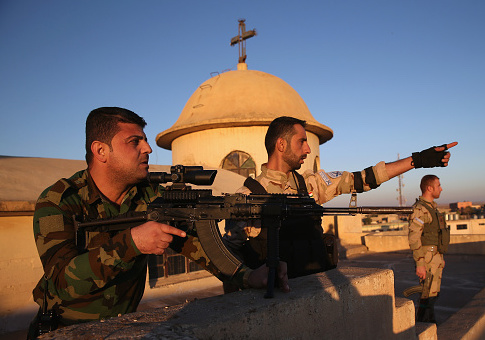Vice President Mike Pence announced two weeks ago that the United States would intensify efforts to deliver aid to Iraqi Christians. Last October, Pence told a conference hosted by the nonprofit In Defense of Christians that America "will work hand in hand with faith-based groups and private organizations to help those who are persecuted for their faith."
"This is the moment, now is the time, and America will support these people in their hour of need," he said.
"We have a proverb," Athra Kado told the Washington Free Beacon. "I will not believe it unless I see it with my own eyes."
Kado is from Alqosh, a town in the Nineveh Plains of Iraq. He leads Alqosh's branch of the Assyrian Democratic Movement, a political party advocating for Assyrian rights in Iraq. He also directs the media center for the Nineveh Plain Protection Units, a military force allied with the Iraqi government that provides security in the southern region of the Nineveh Plains for predominantly Christian communities.
Fewer than 250,000 Christians are estimated to still live in Iraq, a decline of approximately one million people since 2002. Most live in the Nineveh Plains and Iraqi Kurdistan Region.
ISIS entered the plains in 2014, and tens of thousands of Christians fled. Many went to Erbil in Iraqi Kurdistan, settling in churches and parks. They feared refugee camps run by the United Nations would not protect them from jihadists.
Christians, says Edward Clancy of the nonprofit Aid to the Church in Need, "were given the ultimatum of paying the jizya [a tax levied on non-Muslims], being subjugated to that, or leaving." The last option was "staying and probably dying."
Then-secretary of state Rex Tillerson declared ISIS's actions against Christians and other religious minorities in Iraq to be genocide in 2017.
Rebuilding efforts have begun, but progress is slow and uneven. The Nineveh Reconstruction Committee states that over eight thousand families have returned to the Nineveh Plains—still less than half of the number of families living there prior to 2014. Moreover, less than 40 percent of all properties have been rebuilt.
In some places, few Christians have returned. Only two families have come back to the town of Batnaya. Ines San Martin of Crux reported that "there's virtually nothing to go back to, raising the question of why any of its former residents would ever want to return."
Other towns and villages offer reasons for hope. In Bakhdida, almost half of the Christian community has returned. Juliana Taimoorazy, president of the Iraqi Christian Relief Council, said when she visited Bakhdida in January, "life had not returned back to normal, as normal as one can get post-ISIS."
"It looked dead, garbage piled up everywhere. It was just awful," she continued.
Taimoorazy's assessment brightened after returning a few months later. "Life had returned to the streets of Bakhdida, shops were open, nightlife had returned to the city," she told the Free Beacon. Despite evident progress in Bakhdida, residents remain uncertain about the future.
"A lot of hope is in their hearts and minds," says Taimoorazy. But new homes are not enough. "Providing food or building houses only goes so far because," she adds, "first and foremost, what is on their minds is security."
Efforts by the U.S. government to provide aid to Iraqi Christians have thus far been stymied by bureaucracy. Soon after Pence announced that USAID administrator Mark Green would travel to Iraq on a mission to expedite the aid process, Green penned a piece for the Wall Street Journal.
"I will assure [Christian and Yazidi leaders] that American assistance will soon turn from an inconsistent trickle into a steady stream," he wrote. "I will present President Trump with a comprehensive assessment of any roadblocks that prevented the speedy distribution of aid."
Renewed promises of aid are welcome, but advocates for Iraq's Christian community remain skeptical.
After Pence's speech in October, Taimoorazy spoke to colleagues in Iraq. "Whomever I spoke with, whether they were politicians or aid workers or lay people, they all laughed," she said.
There is more hope following Pence's recent announcement, says Taimoorazy, but aid will be useless if it ends up in the wrong hands. The money must go to organizations that are "trustworthy" and have "proven track records on the ground."
Christians need more than new homes and food, however, if they are to remain in Iraq.
Clancy observes that infrastructure still needs to be rebuilt. Christians are "sitting there, waiting in the sun, for somebody to answer." They are, for example, lacking safe sources of water.
"The Tigris River," notes Clancy, "has been somewhat poisoned by the effects of the war. In some places, Christian families can't even irrigate their farms because the water is so polluted."
Christians also need a long-term political solution to ensure their security.
Zina Kiryakos, president of the Iraqi Christian Human Rights Council, says Christians desire a strong, pluralistic Iraq that respects the rights of their community. "They want to be part of Iraq," she told the Free Beacon, but they also want greater self-governance.
"There has to be something done to make sure Christians are not left in the cold, that there is representation in the government, that there is protection of them," adds Clancy.
Beyond a political solution, it is also necessary to help individuals heal from the suffering of the past few years.
"Building the human person" is essential to recovery, observes Athra Kado, since generations of Christians in Iraq have experienced severe challenges. Some individuals in the Nineveh Plains have begun taking steps to improve the mental health of Christians suffering from the trauma of ISIS.
For the Christian community of Iraq, Kado says, it has been "like being in a tunnel without end."
